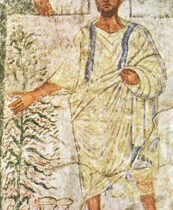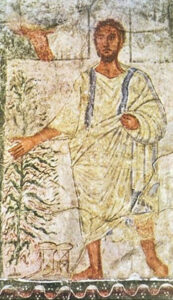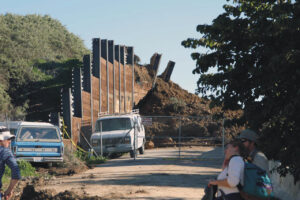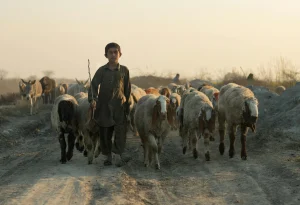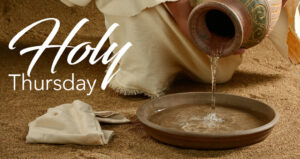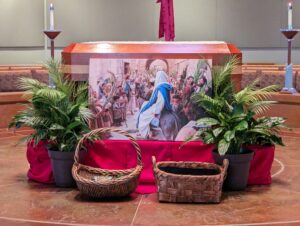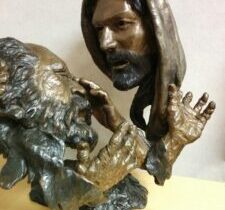“See, I Am Doing Something New”
 “Unprecedented!” “New and improved!” “Today and today only!” “Once in a lifetime chance…”
“Unprecedented!” “New and improved!” “Today and today only!” “Once in a lifetime chance…”
We hear these kinds of exclamations and invitations routinely in our lives. Print, digital, audio, even word-of-mouth sources invite us, even seduce us, to look at products and ideas whose promoters typically hope to profit in some way by coaxing us to endorse or purchase them. Part of becoming an adult is to learn that these invitations are generally not all they claim to be. Very few things are totally new or available only once in a lifetime.
Still, when we hear the Lord say, “See, I am doing something new!” we should probably pay attention!
Isaiah, speaking in the Lord’s name, begins his instruction with a reminder of the defeat of the Egyptian army at the crossing of the Red Sea. Then comes the surprising statement, “Remember not the events of the past…” Why not? Because, “I am doing something new!”
What is this new action? New paths are opening in the desert, rivers are flowing in the desert wastelands for the people and animals who live in or pass through them. This is happening now, pay attention. I am doing it for you, a people I have chosen to be my own.
Rivers in the desert? Pathways opening? A way is being prepared for the people to return home to their ancestral lands. As this happens, new ways of living and being open up. Transformations occur. Those who hear the Lord’s words here are not the same as those who found themselves taken into exile in another land. Something new is happening. It’s time for praise of the One who has cared for them while in exile and now opens new possibilities for them. (Is 43:16-21)
Jesus too brought a new approach in his interactions with those who came to him. St. John tells us about the time some of the religious authorities tried to trap him with an “either or” type of situation. They brought a woman before him, probably quite disheveled and frightened. She and a man had been caught in the act of adultery. Only the woman had been brought to Jesus, though both had broken the Law. Those who dragged her before Jesus for judgement asked him what they should do, since the Law called for her to be stoned to death.
If he said to follow the Law’s instructions, he would be judging her and condemning her for her actions. If he said she should be forgiven, he could be accused of disregarding the Law and thereby breaking it himself. It was a no-win situation.
Jesus responded by doing “something new.” He didn’t respond. He simply bent down and began writing something on the ground. The accusers persisted. Finally, he gave them his response. “Let the one among you who is without sin be the first to throw a stone at her.” Wow! That put everybody on the spot. Who would or could claim to be without any history of breaking the Law, of not always choosing the right way, of sinning?
One by one the accusers walked away. Finally, only Jesus and the woman remained. He asked, “Has no one condemned you?” She responded, “No one, sir.” Jesus didn’t condemn her either, but he instructed her to begin anew and leave behind the life that led her to sin.
“See, I am doing something new…” Not condemnation but instead, second chances. (Jn 8:1-11)
Many years later, St. Paul, writing to the Philippians, reflected on his spiritual journey, “I consider everything as a loss because of the supreme good of knowing Christ Jesus my Lord.” Paul left behind a life of security and honor. He was respected by his peers and entrusted with responsibility to arrest and punish those who were followers of the way of Jesus. And then he met the risen Lord and all changed. Power, prestige, security – all were gone. But in their place, he received the gift of faith in Christ and a righteousness that comes only from God. He lived a life that included a lot of physical pain, rejection, and suffering. But he received them as a way of sharing in the life of Jesus and the hope of resurrection from the dead. All that he had known and lived before was gone, like trash. Now his life was directed to something new – the new way of life and hope opened by Jesus, calling him forward toward God’s calling. (Phil 3:8-14)
Two thousand years later, we too are invited to notice the Lord’s statement. “See, I am doing something new.” This statement applies to each of us in our lives today as well, because it is timeless. Remember, there’s no time in eternity. God’s present has no beginning and no end. Only the Now.
What is it that we are to see now? What is this new thing the Lord is doing? How are paths being opened in the wilderness? Where are new rivers flowing in the desert? Which of us is hearing the Lord’s voice refusing to condemn us? What have we left behind to follow our Lord and share in the promise of the resurrection?
Look around. What do we see? Uncertainty, fear, worry, hopelessness, distrust of strangers? Do we also see people offering support and a helping hand for low income people, the sick, the very young or the old, those with mental or physical illness that makes earning a living impossible, those who come seeking refuge? Are they, are we, setting up programs to provide options and opportunity – working for the common good?
When institutions begin to break down or when they are dismantled before our very eyes, how do we reach out and help those in need? How do we live with hope that leads us ever onward?
One step at a time. One person at a time. The drop of water falling into a pond sends out rings of energy that continue through the entire body of water. Each time one of us refuses to condemn another, offers a smile, a word of encouragement, a helping hand, a listening heart, the energy of love will radiate outward like that drop in the puddle.
These days are not unprecedented, but they are certainly a new experience in the lifetimes of most of us. How we respond in community and outreach in support of those we meet will matter. The Lord is continuing to do “something new.” That Something New is not a return to judgementalism, condemnation of those whose lives are different or frightening, or exclusion of newcomers. The Something New is to continue being welcoming and supportive of others as the Lord is welcoming. It will require us to listen to each other with open hearts and ears, hearing the hopes and fears that so often keep us separated from those whom we don’t know or haven’t yet met. It is making paths through the wilderness of fear and exclusion so that people can travel forward together, returning to a land of shared humanity. It is making rivers of the waters of love and acceptance flow in our communities.
As we enter into these last two weeks of Lent, may our ears be open to hear the Lord’s invitation to enter into this new way he is opening. May we hold on to love and to hope. May we reach out in love and service to those who are hurting or frightened. May we continue to trust in the Lord’s love for each of us. May we know hope and peace and share them in joyful service with all we meet.
Readings for the Fifth Sunday of Lent – Cycle C
Read More





